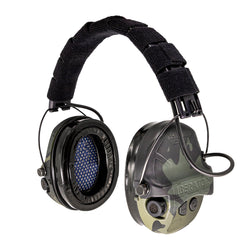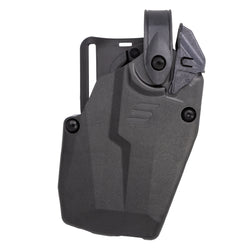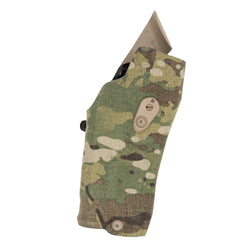For 250 years, the Marine Corps has thrived as America’s Force In Readiness. The Marines brag that they do two things: make Marines and win battles. As we come into the 250th Marine Corps Birthday, I want to share what makes Marines different.
When you look at the four main branches of the United States Military, it’s easy to see where Marines are different. The Army controls the ground, the Navy controls the seas, the Air Force controls the skies, but the Marine Corps does it all.
On a smaller scale.
That’s not all that makes the Marine Corps different. They are the smallest branch by far, but are also by far the most well-known branch. Perhaps the Marine Corps should say they make Marines, win battles, and have great PR.
That’s partly the reason, but that’s not the only reason. The Marine Corps is different, and we are going to see why.
How They Recruit
One of the most famous recruiting posters of all time comes from the Marine Corps. It’s a photo of a mean-looking drill instructor glaring at recruits with the phrase, “We Don’t Promise a Rose Garden.”
That’s true, but it goes deeper than that. The Marine Corps promises nothing, except the opportunity to be a Marine. And it works.
In an era of record-low recruiting, the USMC has met its 2025 goal, its 2024 goal, and its 2023 goals. I could go on, but the USMC isn’t having the same recruiting issues as the other branches. This can be due to numerous factors, but the way the Marine Corps goes about it makes a difference.

The Marine Corps does an excellent job of recruiting the people who want to be Marines. Watch the recruiting commercials from the various armed forces. The Marine Corps appeals to people who want a challenge, who want to fight, and who want to join an elite group of Americans.
They don’t promise you a hundred different jobs or opportunities to see the world. They don’t use massive bonuses to draw in recruits. In an era where the Navy is offering $50,000 for enlistment bonuses, the assistant commandant of the Marine Corps had this to say:
“Your bonus is that you get to call yourself a Marine… That’s your bonus … there’s no dollar amount that goes with that.”
Culture
When you arrive at boot camp, you’re standing on the famed yellow footprints in formation, and you’re told you are going to pass through a set of silver doors. (Called hatches in the Marine speak.)
You’ll only ever pass through these doors one time, and visitors are not allowed to pass through this sacred space. Above those silver doors states, “Through These Portals Pass Prospects For America’s Finest Fighting Force.”
The Marine Corps puts the cult in culture. There is an old joke that goes: There are two branches of the military, the Army and the Navy. The Air Force is a corporation, and the Marine Corps is a cult.

Bootcamp is one of the most effective indoctrinating systems in the world. It works because the people who join the Marines want to be Marines. The culture of the USMC is one of confidence bordering on arrogance.
“You cannot exaggerate about the Marines. They are convinced to the point of arrogance that they are the most ferocious fighters on earth—and the amusing thing about it is that they are.” – Father Kevin Keaney, 1st Marine Division Chaplain.
The USMC culture is one that puts the warrior aspect first. The phrase “Every Marine Is a Rifleman” means that regardless of your role in the Marine Corps, you need to be prepared to fight. This was true in the Pacific Campaign, where heavy casualties pulled Marines from support roles and put them in the infantry.
This was true in the Global War on Terror, where the Marine Corps band was used as a Quick Reaction Force in Iraq. You are a Marine first and foremost, and Marines win battles.
Shared Identity
Marines are big on a shared identity. You are a Marine first and foremost, and it doesn’t matter what you do or who you serve with. While you might have pride in your unit (2/2 Warlords, Rah!), your pride comes from being a Marine.
Soldiers in the Army often have a lot of unit pride. You’re in the Army, but you’re part of the 101st, or the 82nd, or the 10th Mountain Division. Soldiers excel in unit pride, but Marines focus on being a Marine.

Marines don’t wear unit patches on their uniform. The patch that matters most is the one above their breast pocket, which reads, U.S. Marines. Marines don’t focus on what an individual unit has accomplished; they put the pride of battles won in the heart of every Marine.
Unique Mission Set
At its core, the Corps is a Naval Infantry force that makes it unique. The Marine Corps’ role as naval infantry allows them to accomplish both ship-to-shore missions and a conventional infantry role. They can seize ports and beaches, which allows for follow-on forces to join the fight.
Beyond being a Naval infantry, the Marine Corps has a number of unique mission sets. The Marine Corps raises specialized units, like the Littoral Combat Teams, to create an elite, near-guerrilla-like fighting force for littoral regions.

Marines are tasked with guarding embassies around the world. Marine Security Guards are tasked with the physical security of embassies and their personnel. They work hand in hand with the State Department to ensure America’s diplomatic missions can be conducted safely.
Marines also provide physical security for the Presidential retreat at Camp David. Marines are tasked with the White House Sentry Program, where they stand watch at the West Wing of the White House. When the President needs a helicopter ride, it’s HMX-1, aka Marine One, which provides safe air transport for the President.
America’s Force in Readiness
Marines are expeditionary by nature. At any given time the Marine Corps can arrive anywhere in the world in about 96 hours. Marine Expeditionary Units are assigned to Navy ships and float around different parts of the world, ready for whatever may occur.
The MAGTF or Marine Air-Ground Task Force is a self-sustaining force that combines infantry, armor, logistics, and air power. They can rapidly deploy and self-sustain with everything needed to win a battle.
More than that, Marines are tasked with a variety of mission sets outside of combat. When Haiti had a devastating earthquake, Marines showed up to provide humanitarian aid. When piracy threatens global commerce, Marines are deployed with the Navy to be a deterring force.

In the event of embassy evacuations, the Marines can show up with enough fighting power to safely evacuate or reinforce an embassy and secure American interests.
Congress codified the Mission of the U.S. Marine Corps in the National Security Act of 1947, and part of that mission reads: “Such other duties as the President may direct.”
This allows the President to deploy the Marine Corps for rapid, small-scale crises across the globe. The Marine Corps stands by as America’s 911 force.
The Marine Corps is Different
In the Noncommissioned Officer and Petty Officer Handbook, each branch is described. When you get to the chapter on Marines it states:
“Marines are different.”

The Marine breed are different for numerous reasons, but the primary reason the Marines are different is best stated by the 31st Commandant of the Marine Corps, General Charles Krulak:
“The United States does not need a Marine Corps. However, for good reasons which completely transcend cold logic, the United States wants a Marine Corps.”
America wants the culture of the Marine Corps, the legacy of the Marine Corps, and the Marine Corps’ ability to make Marines and win battles.









